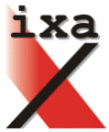LAP9
The course will have five differentiated parts:
i) Language Technologies in the industry: Invited talks where company representatives will present examples of the use of language technologies in their respective companies.
ii) Ready to Use Multilingual Processing tools: We will learn to use and train real language processing tools to automatically obtain linguistic annotations (POS tags, named entities, opinions...) which are often required in Natural Language Applications and in the field of Digital Humanities. We will focus on the IXA pipes toolkit but will also explore deep learning alternatives.
iii) Empowering research: methods, tools and infrastructures for Digital Humanities. Starting from a practical use-case for dummies using the web service ANALHITZA and moving on to the IXA pipes, a ready-to-use multilingual toolkit language processing. Then, use-cases, resource families, digital projects and language infrastructures for empowering research and digital humanities will be shown.
iv) Education and NLP: this module will present Intelligent computer-assisted learning techniques and the use of NLP tools and resources in different learning scenarios (language learning; general domain etc.).
v) Machine Translation: In this module the existing MT paradigms will be presented and the student will have the opportunity to practise with real MT systems. In addition, the impact of this technology on the translation industry will be analysed through the use of post-editing to boost human productivity.
Syllabus:
1- Language Technologies in the industry
2- Ready to Use Multilingual Processing Tools
3- Empowering research: methods, tools and infraestructures for Digital Humanities
4- Education and NLP
5- Machine Translation



